#philosophy
Text
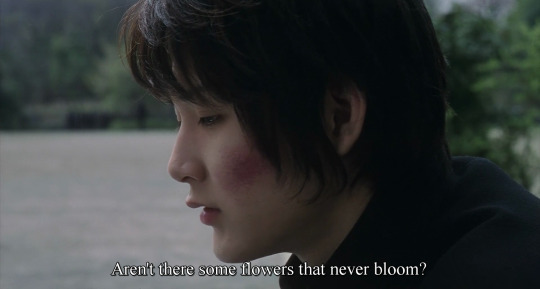
Blue Spring (Toshiaki Toyoda, 2001)
227 notes
·
View notes
Text
Gummigoo & existentialism in TADC - an examination:
Let's start this post by addressing the two most important terms I'll be discussing in this post:
1. Existentialism
A philosophical current which discusses human existence. Main issues that are included in this philosophy are: the absurd, free will, the meaning of life and existential loneliness.
Now, it is no secret that TADC does dab into existentialism in it's plot quite often. It is represented in the main character, Pomni, which begins her journey lost, scared & confused - but proceeds to begin processing the feelings of dread, horror & loneliness (see a theme here?) at the tail end of episode 2, after her encounter with a certain Gummy-Gator.
2. Nihilism
The belief that life lacks inherent meaning or purpose, often leading to a sense of existential despair & the rejection of traditional moral/societal norms.
This approach will be explained as we dive deeper into the relevant episode.
Let's start at the beginning of episode 2:
After the events of the first episode (Pomni first appears at the circus, is introduced to the concept of the circus & her fellow crew members, encounters abstraction & understands that there is no exit, at least not currently) Pomni is having a nightmare in which she is beginning to become abstracted & is sent down the celler with the rest on the abstracted "lost causes", and not only that, as the darkness surrounds her, she's seeing the silhouettes of Caine, Ragatha & Jax (leader, nice one, mean one) all disregarding what is happening to her, allowing her to fall inside the black.
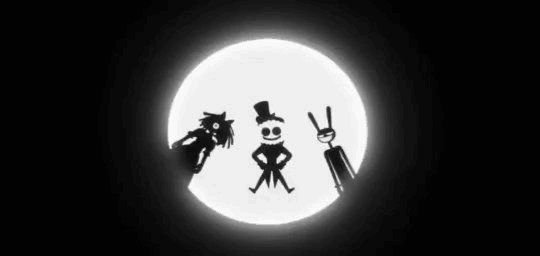
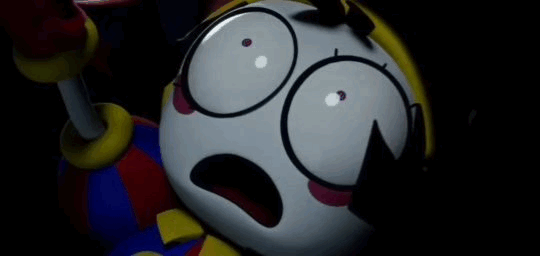
Pomni is exploring the main themes of existentialism in her arc in those 2 episodes:
1. Loneliness - Existentialism deals with human existence in an age where traditional religious beliefs are weakened & the validity of absolute truths is undermined, which leads many to feelings of loneliness and alienation. In Pomni's case,her reality of being a human being, bound by morals, laws (including the laws of physics) & being mostly free to move around in the world as she pleases is shattered once she realizes that she is stuck in the circus, there's no way out. The headset is not coming off, the doors are fading. Loneliness originates from the assumption that one cannot truly communicate with another person, the way Pomni feels alienated from her crew members is a great example of that. No one wants to search for an exit with her, the nicest character (Ragatha) herself is dealing with her own existential thoughts & coping mechanisms:
So, essentially, Pomni realizes she the only person that actually cares about finding an exit. Going back to existentialism, the feeling of existence can feel so unique & strange that it cannot be shared by another, just as it is not possible to share in the feelings of another person's existence. Essentially, Pomni begins to isolate herself from the group: believing her existence is unique, compared to theirs. She will find the door. She will be able to leave. She gets to do all of that, even if it means leaving some of them hurt, and just as, and if not more alone than she is feeling:
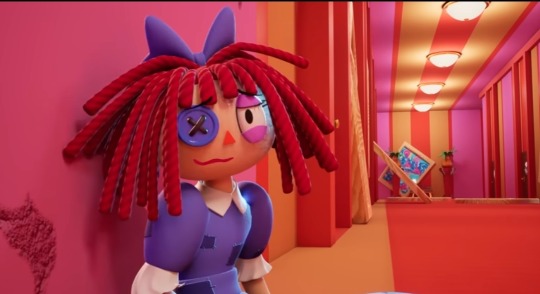
Instead of understanding the existence of the other, we see her choosing herself, her "more real" self over the others. Horror is a natural response to life in a world without meaning and purpose, to which one was thrown without choosing it and in which he was "destined to live" (in this case, the circus). From the very same world characters like Pomni will either part violently, in abstraction (in existentialism: death), without understanding what it was all about, what was the MEANING of it all.
2. Freedom - Existentialism offers more than just a bleak view of existence, it introduces the notion of hope and redemption! Especially emphasizing the positive aspects of human consciousness and will, such as absolute freedom and uniqueness. In TADCs latest episode, Pomni begins to understand that she can find meaning and hope, even if she's no longer in her "human form". She doesn't have to lose her humanity, too. When she falls outside of the map & encounters Gummigoo, this is what was happening to him before:
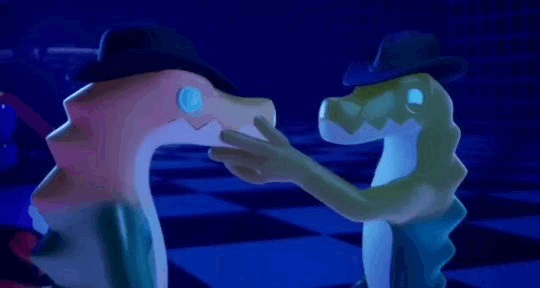
He began to realize that something about his existence was off. That he wasn't who he thought he was. Mirroring Pomni in the sense of his identity, like hers, was given a good shake. One of Gummigoo's questions to Pomni was "what are you people?", but then he realizes that it isn't really what he wants to know. He then asks:
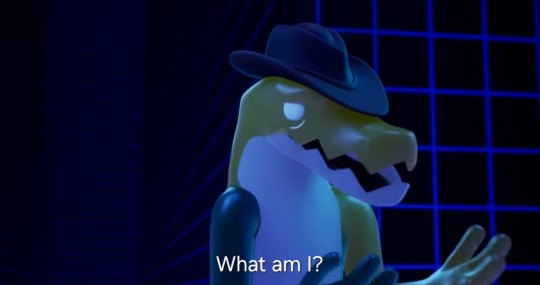
He then tries to sort his coded-in memories: where's mum? The fighter that taught him everything he knew? The one who's whole mission with his bandit crew was for? Then he realizes something even more horrifying: he doesn't remember her face, or if she had a face at all. Then comes the big question "was anything ever real?". Pomni then suggests something:
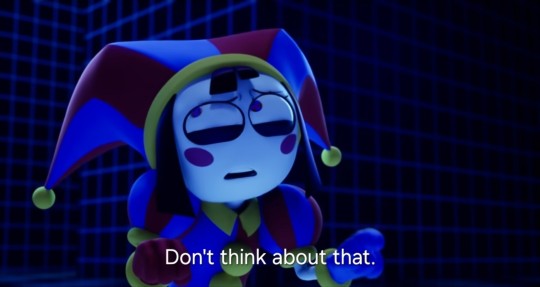
Pomni understands what Gummigoo is going through now, he's having what is called an existential crisis: when someone deeply questions the meaning and purpose of their life, often causing feelings of confusion and anxiety. She understands it because she just went through it herself when popping in the Digital Circus. According to the philosophy of existentialism, an existential crisis may involve confronting the idea that life has no inherent meaning/purpose and grappling with the responsibility of creating one's own meaning in a seemingly indifferent universe. Gummigoo asks of Pomni to tell him exactly what he is
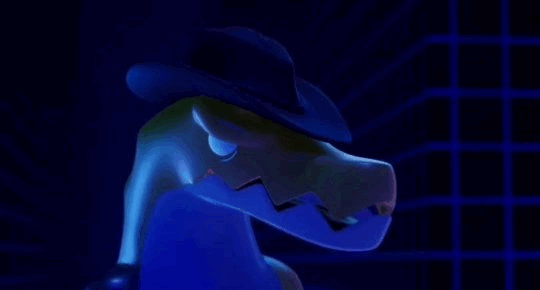
Here, Gummigoo makes his first free choice: he wants to know the truth. He wants Pomni, who's clearly different from him in a sense he can't even yet fathom to tell him what is actually going on, and what the reality actually is. While the idea of freedom in existentialism is not new, it gives it a fresh perspective by highlighting the individuality of existence and condemning conformity. Gummigoo refuses to remain ignorant. He doesn't want to be left in the dark, not anymore. According to existentialism, humans are inherently free and cannot escape this freedom, leading to the famous assertion that "Man is condemned to freedom". In this case, freedom begins with knowledge, choosing awareness. Although, Gummigoo does dabble a bit in despair and nihilism when later Pomni, while trying to launch them back on the surface of the map, notices Gummigoo sulking in the background & asked him for help:
Pomni, softly: Hey, you okay?
Gummigoo, distraught: No.
Pomni: You wanna talk about it?
Gummigoo: What is there to talk about?
At this point there's a beautiful symbolic shot of Pomni walking from a blank & "limitless" background towards Gummigoo, whom sits in a blueprint-like background, defeated:
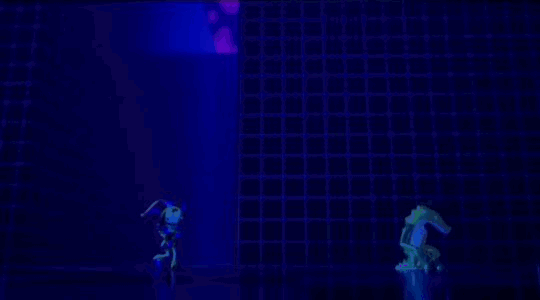
Notice that at the beginning, Pomni's hand is reaching out towards Gummigoo, saying she doesn't just want to leave him below the map, but then when he asks her "why not?" she pulls back her hand as he is saying "I don't matter in the slightest, I'm nothing. My life, my memories, my friends, it's all fake".
Pomni understands what he is feeling, this is very similar to her conversation with Ragatha in the pilot about why go on Caine's adventures at all, instead of looking for an exit. She even says that, as she decides to sit next to Gummigoo, making a very close reference to the nihilistic approach:
Pomni: This may seem weird, but I think I know the feeling [...] feeling like you're nothing is kinda normal, I mean people even feel like that in the world I come from.
But then, Pomni decides to reject this approach & return back to existentialism's approach to the search for meaning:
Pomni: But... You still care about your buddies up there, don't you? I'm sure they still care about you.
Gummigoo, at first still insists on remaining nihilistic:
Gummigoo: What does it matter? What do we have when you people leave? We're just obstacles, created to be defeated & forgotten.
But Pomni insists:
Pomni: Well, you don't have to be.
Existentialist philosophers emphasize that there is a correlation between loneliness and freedom, asserting that while people may feel isolated, they are also liberated to choose their own lifestyles, worldviews, and values. Pomni suggests that Gummigoo returns to the circus with her, a place she begins to realize is, at least for the time being, her new home. She suggest that if he returns there with her, he can become someone real there, too. Like her.
When Gummigoo asks Pomni why is she even trying to cheer him up, Pomni simply replies "I guess, I don't want you to feel like you're nothing", calling back to how she felt in the circus, what the nightmare at the beginning of the episode was affirming in her mind. She did not want anyone to feel this way.
Some existentialists thinkers emphasize freedom in choosing a lifestyle, world view & scale of values. The person is free to adopt a practical philosophy (I am my own person, NPC, video game character or otherwise) but is also free to formulate for themselves the world view that suits them in their own time & ternd, as well as to avoid a consolidated view. This is the type of freedom Pomni wants to offer Gummigoo, the freedom she believes she currently has.
3. The Absurd & Rebellion - I want to discuss Albert Camus' approach here, although there are many other philosophers that discuss the same subject (some even believe the Absurd is its own philosophical current), because I believe his attitude fits best to TADCs approach. He believed that the absurd arises from the inherent clash between humanity's desire for meaning and the indifference of the universe. In his essay "The Myth of Sisyphus," Camus famously states that the only truly serious philosophical question is whether or not to end one's life in the face of the absurd. He suggests that instead of succumbing to despair, like nihilists suggest, one should embrace the absurd & live life to its fullest, finding meaning through rebellion against the absurdity of existence.
Pomni: [...] And... I could use a friend.
Gummigoo: ... A friend.
Gummigoo, standing up: You're a strange little character, suppose I could give it a try. All I ask is that we don't tell the lads about this [...] I don't want to drag them down with me.
Gummigoo accepts Pomni's approach, but he does want to protect his friends from the truth, seeing as he doesn't want them to go through the same type of crisis & pain he went through. He wants to rebel, but he doesn't want anyone else to carry the burden.
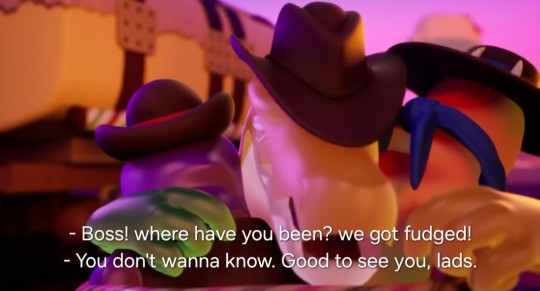
After going back to the circus... Well, y'know what happens.
After that, Pomni begins to cackle maniacally & smiling in a deranged way. Ragatha tries & fails to console her:
Ragatha: I'm really sorry about that, Pomni. At least you tried. You know, he might be back in a future adventure, I know Caine sometimes likes to reuse NPCs
But then, Zooble approaches:
Zooble: Got everything ready.
Ragatha, to Pomni: Hey,you'd like to at least wanna join us for Kaufmo's funeral? We like to have a little funeral service to remember the people who abstract [...]
Kinger: It's the least we can do to honor their memory.
As Pomni is listening to the Eulogies given by Ragatha, Gangle, Kinger & Zooble, she remembers her nightmare but this time, were shown a different ending:
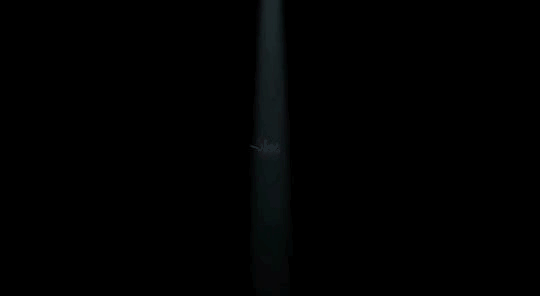
Pomni finally realizes that even if she's trapped, even if there is no exit, even if she will lose people she loves, or even herself, she won't be alone. There are going to be people there to catch her, console her, hold her, mourn her.
She won't end up alone.
She is not a nobody.
She is a person.
She has meaning.
Thank you so much for reading 🙏💜
#tadc#the amazing digital circus#gooseworx#pomni tadc#the amazing digital circus pomni#tadc pomni#pomni posting#pomni#tadc gummigoo#gummigoo#gummigoo the amazing digital circus#ragatha#ragatha tadc#ragatha the amazing digital circus#the amazing digital circus ragatha#the amazing digital circus caine#tadc caine#caine#tadc zooble#zooble#tadc gangle#gangle#tadc kinger#kinger#tadc jax#jax#philosophy#existentialism#nihilism#media review
101 notes
·
View notes
Text
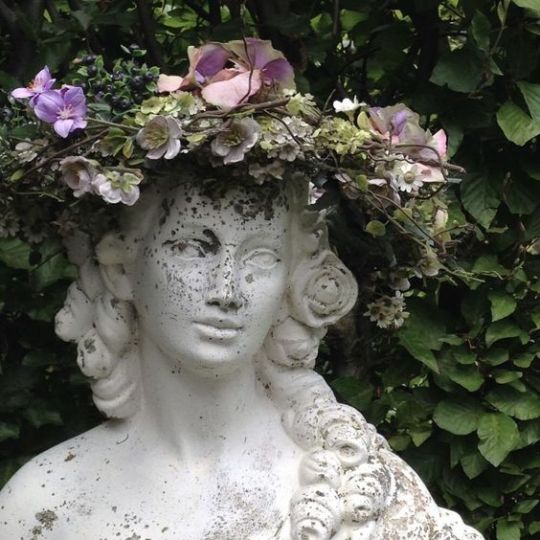
...in the garden every woman can be her own artist...
104 notes
·
View notes
Text
Being mean makes you ugly, no matter how pretty you think you are.
#poets corner#poets on tumblr#quoteoftheday#quotes#poetry#life#feelings#quote of the day#life quotes#poetry quotes#wisdom#words#writers on tumblr#writing#thoughts#spilled thoughts#spilled ink#heartfelt#emotions#poetic#dreams#love quotes#creative writing#philosophy#musings#introspection#introspective#soulful#prose#daily inspiration
73 notes
·
View notes
Quote
Be diligent and intelligent. Diligence is quick to carry out what intelligence has lingered over. ... A lofty motto: make haste slowly.
Baltasar Gracián, The Art of Worldly Wisdom
#philosophy#quotes#Baltasar Gracián#The Art of Worldly Wisdom#diligence#intelligence#thinking#actions#choices#ethics
76 notes
·
View notes
Text
Taylor Swift is Derivative nonsense, not intellectually placed allusions. I'll die on this hill, and I have many more examples beyond just the one listed below.
Let’s talk about the difference between being derivative and utilizing allusion in text. :)
I’ve seen a lot of defenses for Taylor Swift’s work that hinges on the theoretical concept of intertextuality. People don’t often know that they are arguing over the validity (or emotional impact) of intertextual cessions in Swift’s writing, but they are.
Intertextuality, if you don’t already know, is a set of determinable interwoven texts that all correspond on a particular thematic point. This encompasses, but is not limited to, the literary device of allusion.
There are many examples of intertextual works, since it is intrinsically post-modern. Yet, I want to talk about how Taylor Swift attempts allusions that only ever fall into flat-facing derivative blandness. I want to talk about how, yes, Swift is in the spirit of the age; yet her work devolves into derivative insincerity simply because she is not an artistic writer.
Now, for an egregiously bad allusion. (I think it’s worse because Romeo and Juliet is my favorite Shakespeare play). In “The Albatross” Swift writes, “A rose by any other name is a scandal” in which the obvious allusion is to Shakespeare's, “A Rose by any other name would smell as sweet” from the play Romeo and Juliet. The line in the play is often misquoted, so perhaps Swift is just ignorant, however the line means to draw attention to the fact that names are just words the that do not actually dictate the internal nature of someone.
The full line, from Shakespeare, reads “O be some other name/ What’s in a name? That which we call a rose/ by any other name would smell as sweet;/ So Romeo would, were he not Romeo call’d” (Romeo and Juliet). Thus, Juliet is lamenting the full divisive way in which her family is at odds with Romeo’s family; upon deeper consideration too, Juliet is modulating how social pressures, often outside our control particularly in youth, can impact and modify the discourse between reality, doing what is proper in accordance with the majority, and intrinsic human desire to fulfill our own needs. So, the line is not only explaining how Romeo and Juliet cannot be together overtly due to familial dispute, but in the same words it explains the full breadth of social dissertation for the pursuit of individual need. Afterall, he would still be Romeo "were he not Romeo call'd." Juliet is admitting that she would still love him with or without the constraint of social obligation due the environment, or family, in which we are born; thus, we can see how individually human desire can be placed at odds with the demands of mainstream society.
This is a nuanced conversation when considering it through moral theory. For instance, we often talk about how people should not go against the mainstream for immoral pursuit of individual desire and that is reasonable; yet herein Shakespeare's work the thematic point is on the morality of love and desire to go against social convention. Shakespeare is saying, "Love is a greater moral good than that of social obligation to follow tradition and to hate who you are trained to hate based on parental teaching." It's a genius fucking line, in a genius fucking play. Now, we all know how the play ends, the lovers run off together, they have a brief day in the sun. However, social pressure and adult obligation catch up to them again and thus they die for it. They die for their courage to love and to go against the mainstream.
Let’s return to Taylor Swift, the human embodiment of mainstream social pressure, as she writes that "a rose by any name is a scandal." As such, she is saying that all roses everywhere are just a scandal waiting to happen. If everything is a scandal, rather than speaking to any nuance grief to the pervasiveness' of social pressure to adhere to mainstream. Swift is simply throwing petulance to the world, by saying “Rose by any other name is a scandal” she limits what a rose could be, or become in using the verb “is” to fully solidify a rose as a scandal; which is a message that is diametrically opposed to the thematic point Shakespeare is making with his line. For Swift, there is no redemption, no nuance, and there is no subtext in which implicit messaging lay to tell people that going against the mainstream might just be the last thing you ever do but God is it worth it. To live with that brief day in the sun. And die for courage. Swift is just saying the opposite and stating that the mainstream is inevitable- there is no use in fighting it. A name is a name. It remains to tell the rose exactly what it is. Swift lacks imagination.
I would argue that Swift does make obvious attempts at allusion in her work, yet it is so poorly done because she does not actually see or use the thematic point of the source material from which she pulls her allusions. For allusions, to be done in an artistic impactful manner, we must keep to the thematic point of the source material. When the allusion is done correctly there is a “layering” effect in literature that redoubles the overarching themes of human experience in a way that calls us from the past, Shakespeare, to the present. Thus, is the theory of intertextuality in literary works.
(I made that bold because it's the main point of this, and I don't want anyone to miss it).
Taylor Swift’s work here simply does not measure up to anything artistic, thoughtful, or well-done. It is simply derivative of Shakespeare, but I don't think it qualifies as a true allusion.
#anti taylor swift#the tortured poets department#ex swiftie#ttpd#shakespeare#romeo and juliet#philosophy#moral theory#literary theory#literary criticism#english lit student#the albatross
72 notes
·
View notes
Text
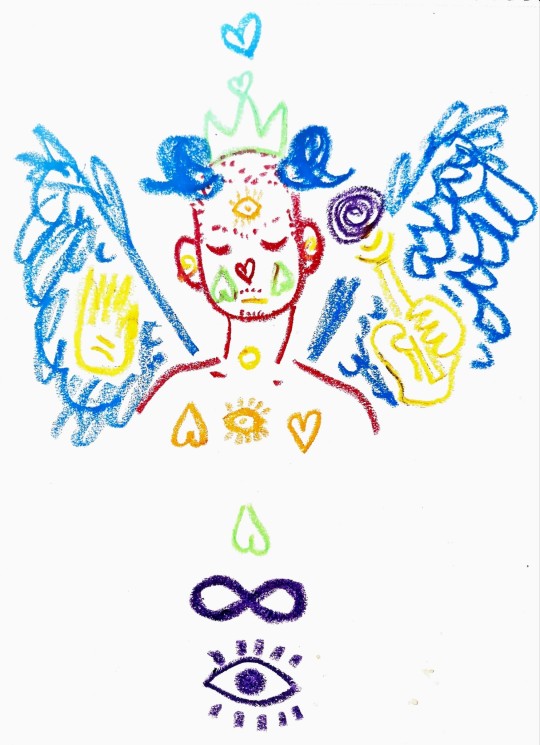
Dyeux 👁 se proterne devant l'Ange-Djinn Souverain(e)
100 notes
·
View notes
Text
#succulents#clace#anna akana#poesia#robot#inthelittlewood#kyoto#philosophy#caturday#loren gray#avatar x reader#gadismelayu#foolish gamers
122 notes
·
View notes
Text
#inthelittlewood#patroclus#philosophy#loren gray#gadismelayu#forever21#techno#fandom ships#darren aronofsky#obey me headcanons#cardan greenbriar
128 notes
·
View notes
Quote
We create ourselves endlessly.
Debasish Mridha
#quotes#Debasish Mridha#thepersonalwords#literature#life quotes#prose#lit#spilled ink#education#happiness#hope#inspirational#intelligence#knowledge#life#love#philosophy#truth#wisdom
39 notes
·
View notes
Text
The Mind is not talking to us but by means of us. Its narrative passes through us and its sorrow infuses us irrationally. As Plato discerned, there is a streak of the irrational in the World Soul.
Philip K. Dick, VALIS
34 notes
·
View notes
Text
sunday really saw a bird die, read Leviathan: Or the Matter, Forme and Power of a Commonwealth, Ecclesiasticall and Civil, and went "oh actually this thomas hobbes person is onto something" huh
#how not to play honkai star rail#hsr spoilers#honkai star rail spoilers#honkai star rail#hsr sunday#philosophy#i'm so sorry
38 notes
·
View notes
Text

those worlds; made of words: syntax & the synthetic secretion.
#poetry#spilled thoughts#dark academia#dark prose#trauma#drugs#depression#alchemy#mental illness#mental health#art#spirituality#sad#introspection#liturature#tw#me#voidic3ntity#life is strange#pain#stoned#poets on tumblr#darkness#original#poem#life#death#poetic#philosophy#morbid
27 notes
·
View notes
Text
You are already invincible, invisible, indescribable, with no life, no personality, no thoughts, and no anxiety.
You see a body, thoughts arise and you call it “me” and “my thoughts” (because people told you it was you) but where is the “me” who is thinking this? What even is a “me”?
(Notice how thoughts cease when you search for the “me” 🫢)
You could say you are the brain but what is keeping the brain alive? There has to be something prior to neuronal activity. Be THAT and throw away the sense of “I” which is the root of all suffering.
I used to think “I” was the highest state, but problems can exist where there is an “I”. If there is no “I” there is no “I have __” or “I am __” that is the start of all trouble 🙄.
#advaita vedanta#nondualism#nonduality#consciousness#god consciousness#brahman#atman#advaita#philosophy#spirituality#spiritual journey#spiritual awakening#spiritualgrowth#spiritual disciplines#higher self
32 notes
·
View notes
Text
A stupid man's report of what a clever man says can never be accurate, because he unconsciously translates what he hears into something he can understand.
Bertrand Russell, A History of Western Philosophy
35 notes
·
View notes
Quote
Fearlessness and lavishness do not suit mortal men, rather it becomes them to tremble and to count every penny, seeing what a state of poverty and impotence they exist in. That is why these two virtues are so rarely met with, and when they are met, why they arouse such superstitious reverence in the crowd. "This man fears nothing and spares nothing: he is probably not a man, but a demi-god, perhaps even a god."
Lev Shestov, All Things Are Possible
#philosophy#quotes#Lev Shestov#All Things Are Possible#courage#fear#cowardice#humanity#virtue#character#ethics
39 notes
·
View notes